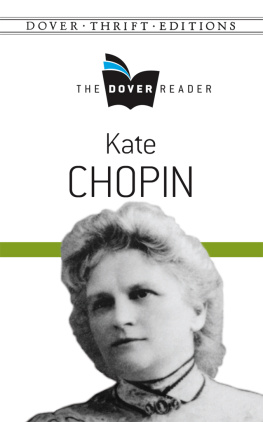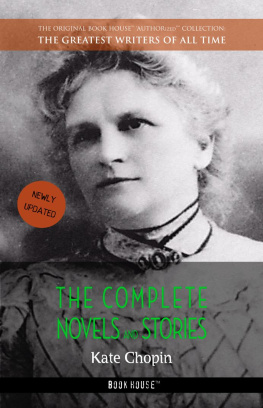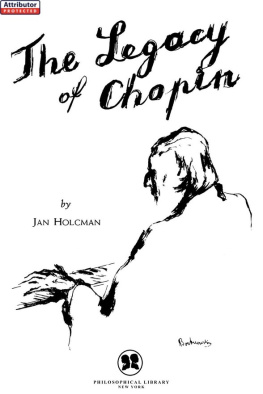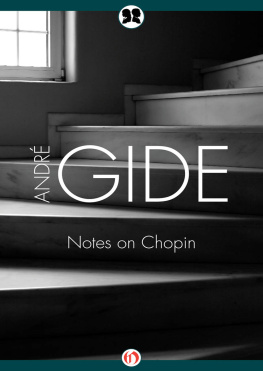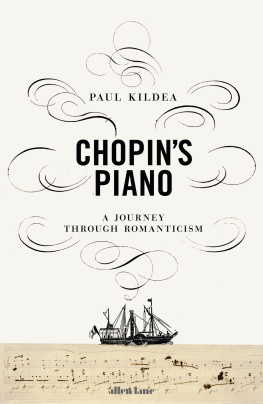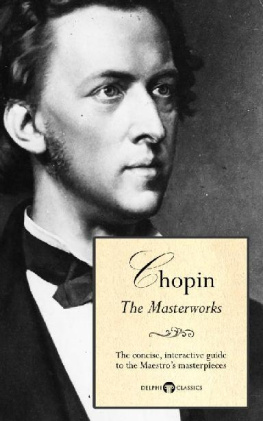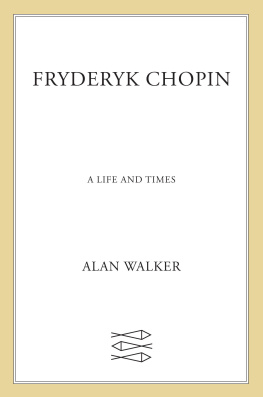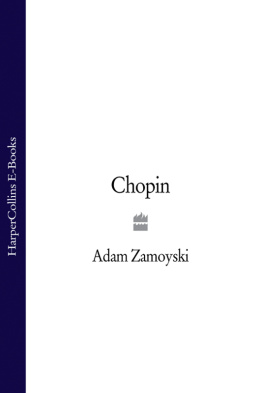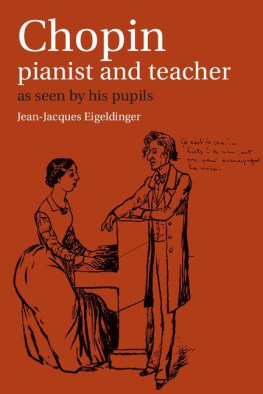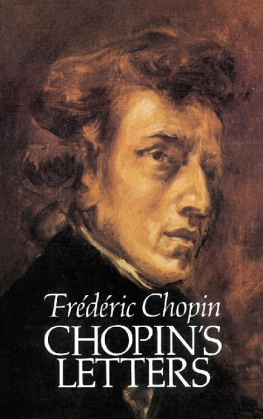
Kate Chopin

DOVER PUBLICATIONS, INC.
Mineola, New York
DOVER THRIFT EDITIONS
GENERAL EDITOR: MARY CAROLYN WALDREP
EDITOR OF THIS VOLUME: SUSAN L. RATTINER
Copyright
Copyright 2015 by Dover Publications, Inc.
All rights reserved.
Bibliographical Note
Kate Chopin: The Dover Reader, first published by Dover Publications, Inc., in 2015, is a new compilation of works by Kate Chopin, reprinted from authoritative sources. The Note and explanatory footnotes have been specially prepared for this Dover edition.
Library of Congress Cataloging-in-Publication Data
Chopin, Kate, 18501904.
[Works. Selections]
Kate Chopin : the Dover reader / Kate Chopin.
pages cm. (Dover thrift editions)
eISBN-13: 978-0-486-80341-8
I. Title.
PS1294.C63A6 2015
813'.4dc23
2014034326
Manufactured in the United States by Courier Corporation
79123801 2015
www.doverpublications.com
Note
KATE CHOPIN (ne OFlaherty) was born into a wealthy St. Louis, Missouri, family in 1851. Her father died when she was very young, and Chopin was raised by her mother, grandmother, and great-grandmotherthree strong-minded widows. Of French Catholic and Irish extraction, she was imprinted with the elaborate conventions of her social class. In addition to attending school at the Sacred Heart Convent, Chopin read widely on her own, including the French and English classics.
In 1870, two years after graduating from Sacred Heart, she married Oscar Chopin, a member of a prominent Louisiana Creole family. The couple lived in New Orleans for a number of years, then moved to a small plantation in the Louisiana parish of Natchitoches. Until her husbands death from swamp fever in 1882, she lived as a respectable wife in New Orleans and northwest Louisiana, bearing six children. There she was exposed to the Creole culture that would later supply much of the material for her fiction.
Returning as a widow to St. Louis, with her resources dwindling and a family to support, Chopin gradually turned to writing, possibly out of economic necessity. Her stories and sketches began appearing in magazines in 1889, and her first novel, At Fault, was published a year later. Drawing upon the Creole society of her married life, Chopin gained national recognition during the 1890s as an exemplar of the then-burgeoning local-color movement, which focused attention upon Americas distinctive regional cultures.
Chopins second and last novel, The Awakening, was published in 1899 and aroused a storm of controversy for its then-unprecedented treatment of female independence and sexuality, and for its unromantic portrayal of marriage. Her earlier work was overshadowed by the novels critical failure, and Chopins writings descended into obscurity. Socially ostracized for her scandalous frankness, Chopin died in 1904; it was not until the second half of the twentieth century that The Awakening was rediscovered, and assumed a place of significance in the canon of American literature.
Twenty-nine of Chopins stories are represented in this volume, and many of these works capture the lifestyles of the Cajuns and Creoles that Chopin had observed during her years in Louisiana. They also illustrate her keen ability to portray the nuances of her characters psychological states.
Sensitive readers should be forewarned that the text in places contains racial references characteristic of the era, which may be deemed offensive by modern standards.
Contents
Nonfiction
MY WRITING METHOD
EIGHT OR NINE years ago I began to write storiesshort stories which appeared in the magazines, and I forthwith began to suspect I had the writing habit. The public shared this impression, and called me an author. Since then, though I have written many short stories and a novel or two, I am forced to admit that I have not the writing habit. But it is hard to make people with the questioning habit believe this.
How, where, when, why, what do you write? are some of the questions that I remember. How do I write? On a lapboard with a block of paper, a stub pen, and a bottle of ink bought at the corner grocery, which keeps the best in town.
Where do I write? In a Morris chair beside the window, where I can see a few trees and a patch of sky, more or less blue.
When do I write? I am greatly tempted here to use slang and reply any old time, but that would lend a tone of levity to this bit of confidence, whose seriousness I want to keep intact if possible. So I shall say I write in the morning, when not too strongly drawn to struggle with the intricacies of a pattern, and in the afternoon, if the temptation to try a new furniture polish on an old table leg is not too powerful to be denied; sometimes at night, though as I grow older I am more and more inclined to believe that night was made for sleep.
Why do I write? is a question which I have often asked myself and never very satisfactorily answered. Story-writingat least with meis the spontaneous expression of impressions gathered goodness knows where. To seek the source, the impulse of a story is like tearing a flower to pieces for wantonness.
What do I write? Well, not everything that comes into my head, but much of what I have written lies between the covers of my books.
There are stories that seem to write themselves, and others which positively refuse to be writtenwhich no amount of coaxing can bring to anything. I do not believe any writer has ever made a portrait in fiction. A trick, a mannerism, a physical trait or mental characteristic go a very short way towards portraying the complete individual in real life who suggests the individual in the writers imagination. The material of a writer is to the last degree uncertain, and I fear not marketable. I have been told stories which were looked upon as veritable gold mines by the generous narrators who placed them at my disposal. I have been taken to spots supposed to be alive with local color. I have been introduced to excruciating characters with frank permission to use them as I liked, but never, in any single instance, has such material been of the slightest service. I am completely at the mercy of unconscious selection. To such an extent is this true, that what is called the polishing up process has always proved disastrous to my work, and I avoid it, preferring the integrity of crudities to artificialities.
(1899)
Short Stories
WISER THAN A GOD
To love and be wise is scarcely granted even to a God.
Latin Proverb.
I
YOU MIGHT AT least show some distaste for the task, Paula, said Mrs. Von Stoltz, in her querulous invalid voice, to her daughter who stood before the glass bestowing a few final touches of embellishment upon an otherwise plain toilet.
And to what purpose, Mutterchen? The task is not entirely to my liking, Ill admit; but there can be no question as to its results, which you even must concede are gratifying.
Well, its not the career your poor father had in view for you. How often he has told me when I complained that you were kept too closely at work, I want that Paula shall be at the head, with appealing look through the window and up into the gray November sky into that far somewhere, which might be the abode of her departed husband.
It isnt a career at all, mamma; its only a make-shift, answered the girl, noting the happy effect of an amber pin that she had thrust through the coils of her lustrous yellow hair. The pot must be kept boiling at all hazards, pending the appearance of that hoped for career. And you forget that an occasion like this gives me the very opportunities I want.
Next page
